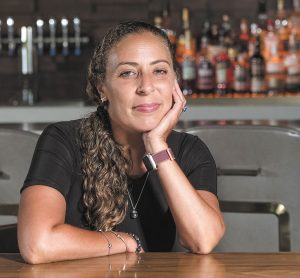Subscriber Benefit
As a subscriber you can listen to articles at work, in the car, or while you work out. Subscribe Now
Indiana University Robert H. McKinney School of Law
University of Wisconsin Law School, 2011
Why did you decide to enter the legal profession?
Injustice and inequality.
What does “diversity, equity and inclusion” mean to you?
It means that opportunity is not provided or limited by immutable characteristics.
How did you get involved in DEI work, and why have you stuck with it?
I got involved in DEI work by accident. I am a law professor in a traditionally white space. Being a person of color in the legal academy thrust me to the forefront of DEI, especially after the George Floyd tragedy and 2020 summer of social movement.
What would you say to someone who perceives “DEI” as a business “buzzword”?
They are kinda right and kinda wrong. It’s only a “buzzword” if you, your company, agency or organization are not actually doing DEI work. But for those of us making a concerted effort and institutions that are working toward equality, DEI is not a buzzword. It means something very, very important.
What is the most significant change you’ve seen in the legal profession since you began your career?
The enrollment of more women in law school and more frequent discussions of race, gender, socioeconomic disparities and sexuality in class.
What’s the best advice you’ve ever received?
Learn to rest. Don’t give up.
How do you spend your free time?
Barefoot and on the beach.
What was your favorite — and least favorite — class in law school?
My favorite class in law school was the criminal defense clinic and my least favorite was Tax.
One of your primary areas of focus is reentry work. Why is that work important to you, and how does that work fit into larger DEI efforts?
For me, reentry is the epitome of DEI. Folks returning home from jail or prison are disproportionately poor, people of color, living in high crime areas. More importantly, this group is perhaps the most politically powerless class in America. The formerly incarcerated are systematically deprived of civil rights, stigmatized as pariahs and pushed to the fringes of society. Reintegration challenges everyone’s commitment to DEI in virtually all political, economic and social spaces.
There has been a heavier focus in recent years on reforming criminal law to make it more equitable, primarily in terms of racial justice. Do you think those efforts have been successful?
We are slowly getting there. Statistics over the past five years show a noticeable reduction in the percentage of African Americans being arrested, prosecuted and imprisoned across the board. Police departments are training officers in implicit bias and collecting critical demographic data to improve policing techniques. Prosecutors are making better screening decisions based on empirical research and resources. And courts are engaging more and more in the reentry process of criminal defendants.
Another aspect of DEI in criminal justice reform that may not be so obvious is that it is a bipartisan effort. For me, this means we have a better chance that things will get done in this arena. Both sides of the aisle having been working together for over two decades, overhauling the way America does criminal justice. A great example is the federal reentry court, known as REACH (Re-Entry Assistance and Community Help), in the Southern District of Indiana here in Indianapolis. The late federal Judge Larry J. McKinney, a Republican appointee, is the founder of the federal reentry court. Together with Magistrate Judge Tim Baker, Judge Doris Pryor (an assistant U.S. attorney then) and Magistrate Judge Mario Garcia (a criminal defense attorney then), Judge McKinney started an innovative and collaborative court that effectively assists dozens of high-risk (of recidivism) folks in their reentry journey. REACH resets the criminal justice narrative by including prosecutors, defense attorneys, probation and the court in assisting and empowering folks returning home.
We still have a long way to go, but I believe that we (and I mean everyone) are starting to realize that the current system is truly broken and that changes must be made if our democracy is to survive. It will be painful, but I have faith that America can get there.
Please enable JavaScript to view this content.
